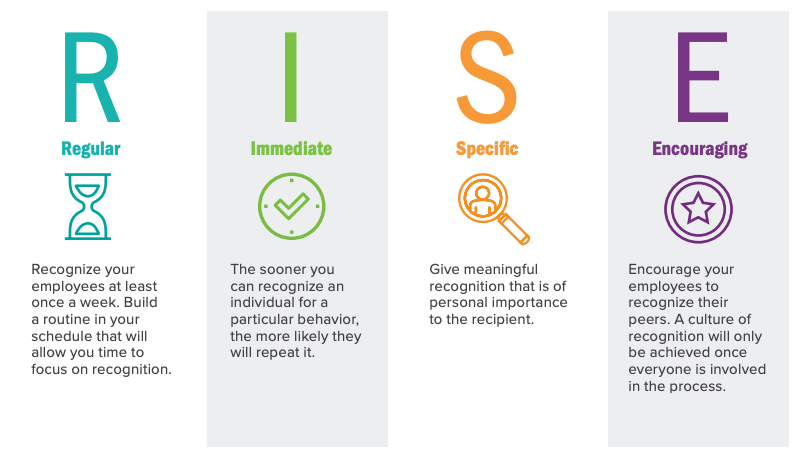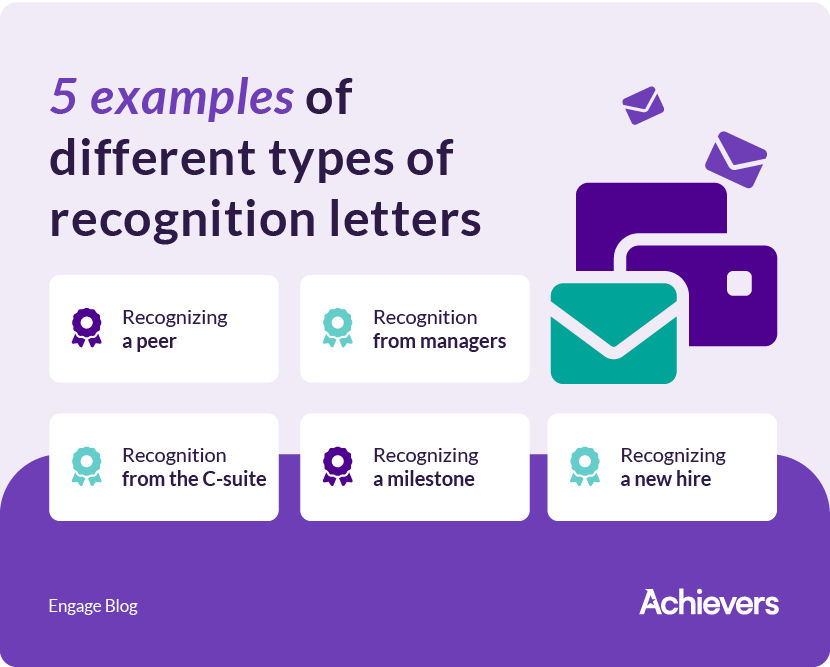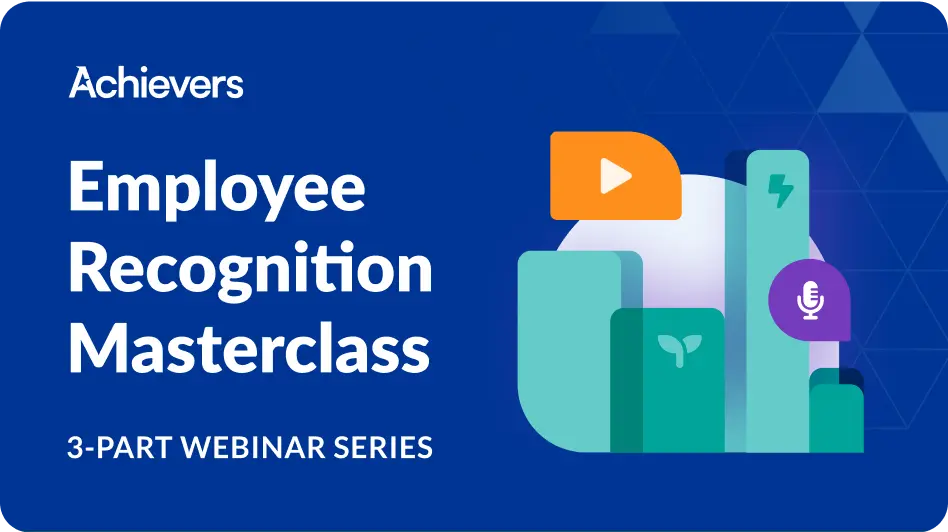

Recognizing employees is something every organization needs to prioritize, and a recognition letter is a great way to do that. Why? Organizations that recognize employees regularly are:
But knowing how to express recognition can be difficult, especially when putting your thoughts down in writing. And that’s without considering tailoring recognition to fit the many digital channels available.
To write a great recognition letter, you need to understand why and how employees want to be recognized and how to draft letters for every situation. The recommendations and examples here will get you started with providing meaningful messages of recognition in no time.
A recognition letter is a message of appreciation sent to an employee. It can be anything from sharing a note of thanks, acknowledging a recent win, or sending a message of congratulations. And it’s one of the most effective ways to recognize employees: 85% of professionals want to receive thanks daily, and 36% of women, along with 28% of men, prefer that thanks to be in writing.

When creating a recognition letter, keep the principles of R.I.S.E. in mind:
You should also use all available tools to make writing and sending recognition messages as easy and fun as possible. For example, with an employee recognition platform, you can quickly recognize multiple employees in a single message. You can even tie each recognition to a company value, which can pay huge dividends — organizations with cultures aligned with their values are six times more successful than their competitors.
Make sure you choose an employee recognition platform that offers all the features you need to make both giving and receiving recognition a great experience.
Bonus tip: For more information on best practices for recognition, look at these webinars by HR expert Meghan M. Biro on the importance of frequent recognition and how to shape a culture of recognition.
Writing a recognition letter is important for several key reasons:
A recognition letter is a formal acknowledgment of an employee’s contributions and achievements. In it, you should express specific appreciation for their work, use positive language, personalize the message, and connect their efforts to company values or goals.
Writing an employee recognition letter involves several steps to ensure it’s thoughtful, genuine, and impactful:
By following these steps, you can create a meaningful recognition letter that acknowledges the employee’s efforts and reinforces their value to the organization.

Here are 5 sample employee recognition letters that could be sent personally as a note or publicly on your employee recognition platform. Remember to always keep R.I.S.E. in the back of your mind when writing a recognition letter, and make an effort to ensure each message is both specific and encouraging.
Fostering peer-to-peer recognition is a fundamental part of incorporating recognition into your organizational culture. Gartner has found that peer recognition can boost employee performance by up to 14 percent. After all, peers know each other the best and have the most opportunities for showing appreciation.
Encourage your team members to recognize each other in the spirit of this example letter:
Hi Evan,
Thanks for your invaluable help with my presentation. Your insights on onboarding new team members and structuring the tutorial were game changers. Your expertise on short notice was deeply appreciated.
Your dedication to “Go Beyond” isn’t just a phrase; you truly embody it. Our CTO loved the presentation and wants more training presentations. I highlighted your contributions and hope we can collaborate further on this project.
Best,
Sarah
This example specifically calls out the colleague’s behavior and ties it to a company value, which helps incentivize further positive actions and build your culture. And by noting that the writer called out their colleague’s contributions to leadership, the letter builds trust and strengthens relationships between the two peers.
Managers are the individuals most employees look to for recognition, and with good reason. Your supervisor is responsible for understanding your talents and putting them to use, and seeing that they appreciate the results of your hard work is incredibly important. There’s a reason that “people leave managers, not companies” — managers are responsible for 70% of variance in employee engagement.
Recognition from managers is visible and serves as an example to the rest of the team. In fact, 28% of employees say that recognition from their manager is the most memorable, and 58% of employees think they would have a better relationship with their manager if recognition were practiced more frequently.
See how meaningful recognition from management can be in this recognition letter:
Hi LeeAnn,
Impressive job leading today’s client meeting on our new marketing campaign! Your detailed justification of our previous work and clear presentation of results were outstanding. You seamlessly addressed their concerns with a tailored plan, embodying our core value of driving success.
You’re a rock star, and your roadmap has set us on a successful path. Everyone on the team should recognize your contributions. I am looking forward to seeing what reward you choose with your points!
Thanks for your exceptional work,
Phoebe
The letter is centered around recognizing a single achievement, and it carefully notes exactly why the employee’s actions were so successful. This kind of encouragement is key for keeping employees motivated and continually driving success. If your company has a points-based recognition program in place, remember to include the note above about finding a “great reward in the catalog to redeem” when including points with your recognition. This reminds team members that they have the opportunity to select a reward that actually matters to them rather than making do with yet another years of service award or branded mug.
Leaders should prioritize recognition to serve as an example for team members throughout the organization. And recognition from the highest levels of leadership is the most visible and has the greatest impact: 44% of employees most value being recognized by leaders above the supervisor level.
Here’s a real-life example of a meaningful recognition letter from the C-suite recently drafted by Achievers’ CEO and President, Jeff Cates.

Jeff sent the recognition above to all employees on Aspire, Achievers’ recognition program, through a company-wide newsfeed. Note how it clearly prioritizes the health and well-being of all team members — exemplifying Achievers’ core principle of “It’s the People” — and focuses on how leadership can support the rest of the organization, rather than the reverse. Using a recognition platform makes it easy for all employees at Achievers, including the C-suite, to recognize other team members daily.
While recognition should be a daily occurrence, that doesn’t mean that recognizing milestones and anniversaries is unimportant. Showing employees that your organization appreciates their major achievements makes all the difference and makes employees feel noticed. You can even consider providing this recognition in the form of a digital celebration card that allows all team members to add special messages or even fun images and GIFs.
Take a look at this thoughtful message recognizing an important milestone:
Hi Bill,
Congratulations on your first work anniversary as an Account Manager! Your transition into the role has been seamless, and your dedication to client success shines through. I’ve witnessed your ability to adapt and excel firsthand, both in meetings and on our product committee. Your contributions to improving our sales handoff process are commendable and will have a lasting impact.
It’s been a privilege working with you this past year, and I’m excited to see your continued success here.
Best regards,
Lacy
This message of recognition is appropriate for anyone, whether they’re a colleague, manager, or even an executive. It’s important to take a comprehensive look at all the accomplishments related to the milestone while still taking the time to zoom in on some specific details. This example is also encouraging and highlights the parties’ joint involvement in a committee, which shows that the author truly appreciates her connection with the recipient.
Recognition should be part of the entire employee experience, starting from the day someone joins the organization. Prioritizing culture when hiring and during the onboarding process helps positively shape an employee’s thoughts and feelings about their new employer. You then need to get team members involved with giving and receiving recognition as soon as possible so they understand this important part of your company culture. Including them in this important company practice will create a sense of belonging and connection that improves employee engagement and helps counter modern trends of disconnection.
Provide your recent hires with recognition letters like these early and often:
Hi Kelsey,
Impressive work in just a few weeks! Your quick learning and contribution to our email marketing tool’s debugging sped up its rollout. Your positive attitude and teamwork have made you a go-to person for new team members. I also appreciate your active role in the celebration planning committee.
Keep up the great work, and don’t hesitate to reach out if you need anything as you continue to excel here.
Best,
Tyler
It’s never too early to start recognizing a new employee. You can even consider sending a message within the first day or two to start incentivizing behaviors you’ve noticed and want to see more of. The letter above calls out specific positive actions and offers the support new hires need to excel.

Looking to elevate your recognition letters beyond just heartfelt words? While the content of your message is undeniably important, the way you format and present that message can make a world of difference in its impact. Here are some additional tips on how to format a recognition letter to ensure your points of appreciation truly shine:
Using these formatting and structuring tips will help organize your recognition letter effectively, making it clear, engaging, and impactful
Social recognition is an integral part of any recognition program. According to an Achievers report, employees recognized monthly are 36% more likely than those recognized quarterly to say they are engaged and productive and are 22% more likely to have high job commitment. And the best way to provide timely, frequent messages of recognition is by using an employee recognition platform like Achievers Recognize.
Achievers Recognize is an award-winning platform that all employees can use to easily send and receive social and points-based recognition from anywhere, with the goal of fostering a real culture of recognition. It features a company-wide newsfeed, digital celebration cards, and robust reporting capabilities that give HR and managers insight into recognition activity across the workplace. It also incorporates the principles of RISE by encouraging frequent recognition — team members won’t be satisfied with an annual pat on the back — and letting employees explicitly tie recognitions to company values.
Achievers Recognize consistently beats the competition, and the data shows it. Achievers’ customers are:
Interested in making recognition easy? Take a test drive of Achievers Recognize today to get started.
Develop your HR strategy in the Employee Recognition Masterclass

Discover what makes an online employee recognition platform effective.

Discover the engagement and retention trends for 2024

Get started on your path to better employee recognition